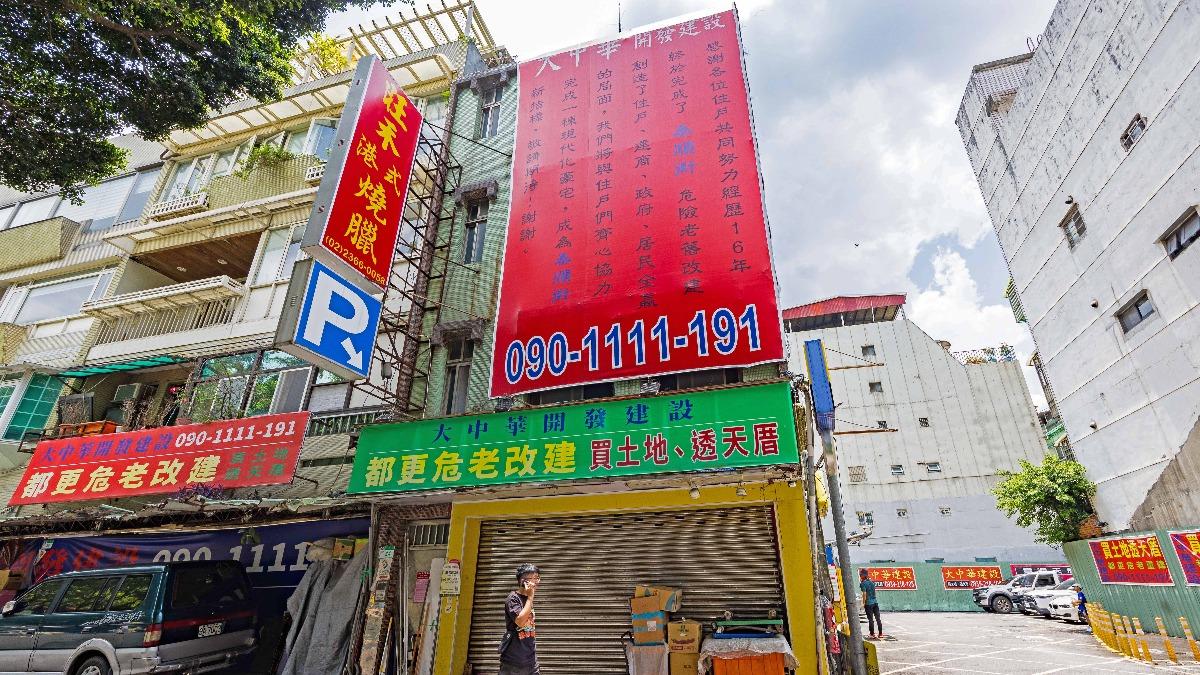Taiwan's expedited building reconstruction program has dramatically sped up the renewal of aging and unsafe structures. Unlike traditional urban renewal projects, which involve lengthy processes and larger areas, this streamlined approach bypasses many hurdles, but critics argue it leads to fragmented cityscapes. As the legislation is set to expire in 2027, experts are debating whether to amend, integrate, or replace it with a permanent solution. Could a hybrid model combining the speed of express reconstruction with the comprehensive planning of urban renewal be the answer?
TAIPEI (Business Weekly/TVBS News) — In a corner of Taipei's Xinyi District (信義區), another old building has been demolished, soon to be replaced by a modern structure distinct from the neighboring low-rise houses. These small-scale demolition and reconstruction projects follow a faster and simpler process than the traditional "Urban Renewal" (都市更新) method familiar to Taiwan.
In 2017, the National Land Management Agency (NLMA, 國土管理署), formerly the Construction and Planning Agency, Ministry of the Interior (內政部營建署), enacted the "Statute for Expediting Reconstruction of Urban Unsafe and Old Buildings" (都市危險及老舊建築物加速重建條例).
This 10-year program has aimed to expedite the rebuilding of aging, unsafe structures over 30 years old with substandard structural safety or seismic performance or those deemed in need of urgent reinforcement or demolition. Some of these buildings were even given the opportunity to undergo the expedited rebuilding process (改建特快車).

No Minimum Area Requirement: Accelerating Integration
Also known as the "express process" for its low threshold and streamlined approach, the statute contrasts with "Urban Renewal" projects, which require a majority vote from 75% or 80% of property owners. While the expedited rebuilding process must secure 100% owner agreement, there is no minimum area requirement, enabling quick integration and bypassing holdouts.
Moreover, urban renewal projects involve business plans, rights transformation plans, and public hearings. Expedited rebuilding projects, on the other hand, need only approval from local building management units, typically completed in three to six months, a stark contrast to the years-long urban renewal process.
According to the NLMA, from 2018 through May this year, 3,658 expedited cases were approved nationwide. This six-year performance far surpasses the 1,838 urban renewal cases completed, reviewed, and approved since 1998.
However, the statute is set to expire in May 2027. The pending sunset has raised concerns about a slowdown in reconstruction efforts for aging buildings. The NLMA is studying potential policy directions but has yet to announce definitive plans.
Experts predict three possible paths: letting the statute sunset, amending it and incorporating it into the "Urban Renewal Act" (都更條例), or normalizing it as a parallel system.
Peng Chien-wen (彭建文), professor of land economics at National Taipei University (台北大學), notes that the statute was initially conceived as a 10-year solution for the urgent reconstruction of dangerous buildings and should naturally expire in 2027. Alternatively, the law could be amended and partially integrated into the "Urban Renewal Act" to streamline procedures for small-block renewal.
There is also talk of "Reconstruction Express 2.0," which would eliminate the statute's sunset clause, making it a permanent option alongside the renewal act, creating two distinct models for urban renewal.
However, Peng points out that the expedited projects are not without their disadvantages. Urban renewal projects are a more thorough solution, utilizing a review process to resolve disputes and provide volume incentives, enhancing urban cohesion. When large-block urban renewal fails, it often leads to smaller construction projects that splinter urban areas, contributing to fragmentation.

The Impact of Landscape and Block Fragmentation
First, large-block urban renewal creates more cohesive city landscapes and public spaces. In contrast, small-area expedited projects tend to fragment the landscape. Second, when new and old buildings coexist in the same block, future integration becomes challenging. “Imagine a 40-year-old building needing renewal, but its neighbor was rebuilt 10 years ago. Integration becomes impossible,” Peng explains.
"In the long run, Reconstruction Express is not the ideal model for urban renewal,” Peng asserts, noting that these small-scale skinny houses will require further renewal in 30 years. He urges the government to prioritize long-term urban planning over immediate reconstruction efficiency.
Simply put, urban renewal is a time-consuming process but allows for more comprehensive updates, while express reconstruction offers faster solutions at the cost of fragmentation. Could the benefits of both methods be integrated?
"Taiwanese admire Japanese streetscapes but are unwilling to spend over a decade on an urban renewal project as done overseas,” says Hsieh Ming-tung (謝明同), chief secretary of the Taipei City Urban Regeneration Office (URO, 台北市都市更新處). He proposes a hybrid model that merges the flexibility of the expedited rebuilding process with the comprehensive planning of urban renewal, calling it "urban renewal cooperative construction."
For instance, conditions could be established between the 1,000 square meters required for urban renewal and the no-size limit for expedited rebuilding of a new renewal area. If a 100% owner agreement is reached, the government could offer a volume incentive 1.3 times higher than the current regulation, balancing speed and non-fragmentation.
The statute has revitalized Taiwan’s aging infrastructure, accelerating the pace and volume of redevelopment projects. However, this has also led to fragmented neighborhoods. By combining the best elements of both policies, the government can chart a path toward a more cohesive urban landscape.
In 2017, the National Land Management Agency (NLMA, 國土管理署), formerly the Construction and Planning Agency, Ministry of the Interior (內政部營建署), enacted the "Statute for Expediting Reconstruction of Urban Unsafe and Old Buildings" (都市危險及老舊建築物加速重建條例).
This 10-year program has aimed to expedite the rebuilding of aging, unsafe structures over 30 years old with substandard structural safety or seismic performance or those deemed in need of urgent reinforcement or demolition. Some of these buildings were even given the opportunity to undergo the expedited rebuilding process (改建特快車).

No Minimum Area Requirement: Accelerating Integration
Also known as the "express process" for its low threshold and streamlined approach, the statute contrasts with "Urban Renewal" projects, which require a majority vote from 75% or 80% of property owners. While the expedited rebuilding process must secure 100% owner agreement, there is no minimum area requirement, enabling quick integration and bypassing holdouts.
Moreover, urban renewal projects involve business plans, rights transformation plans, and public hearings. Expedited rebuilding projects, on the other hand, need only approval from local building management units, typically completed in three to six months, a stark contrast to the years-long urban renewal process.
According to the NLMA, from 2018 through May this year, 3,658 expedited cases were approved nationwide. This six-year performance far surpasses the 1,838 urban renewal cases completed, reviewed, and approved since 1998.
However, the statute is set to expire in May 2027. The pending sunset has raised concerns about a slowdown in reconstruction efforts for aging buildings. The NLMA is studying potential policy directions but has yet to announce definitive plans.
Experts predict three possible paths: letting the statute sunset, amending it and incorporating it into the "Urban Renewal Act" (都更條例), or normalizing it as a parallel system.
Peng Chien-wen (彭建文), professor of land economics at National Taipei University (台北大學), notes that the statute was initially conceived as a 10-year solution for the urgent reconstruction of dangerous buildings and should naturally expire in 2027. Alternatively, the law could be amended and partially integrated into the "Urban Renewal Act" to streamline procedures for small-block renewal.
However, Peng points out that the expedited projects are not without their disadvantages. Urban renewal projects are a more thorough solution, utilizing a review process to resolve disputes and provide volume incentives, enhancing urban cohesion. When large-block urban renewal fails, it often leads to smaller construction projects that splinter urban areas, contributing to fragmentation.

The Impact of Landscape and Block Fragmentation
First, large-block urban renewal creates more cohesive city landscapes and public spaces. In contrast, small-area expedited projects tend to fragment the landscape. Second, when new and old buildings coexist in the same block, future integration becomes challenging. “Imagine a 40-year-old building needing renewal, but its neighbor was rebuilt 10 years ago. Integration becomes impossible,” Peng explains.
"In the long run, Reconstruction Express is not the ideal model for urban renewal,” Peng asserts, noting that these small-scale skinny houses will require further renewal in 30 years. He urges the government to prioritize long-term urban planning over immediate reconstruction efficiency.
"Taiwanese admire Japanese streetscapes but are unwilling to spend over a decade on an urban renewal project as done overseas,” says Hsieh Ming-tung (謝明同), chief secretary of the Taipei City Urban Regeneration Office (URO, 台北市都市更新處). He proposes a hybrid model that merges the flexibility of the expedited rebuilding process with the comprehensive planning of urban renewal, calling it "urban renewal cooperative construction."
For instance, conditions could be established between the 1,000 square meters required for urban renewal and the no-size limit for expedited rebuilding of a new renewal area. If a 100% owner agreement is reached, the government could offer a volume incentive 1.3 times higher than the current regulation, balancing speed and non-fragmentation.
The statute has revitalized Taiwan’s aging infrastructure, accelerating the pace and volume of redevelopment projects. However, this has also led to fragmented neighborhoods. By combining the best elements of both policies, the government can chart a path toward a more cohesive urban landscape.










